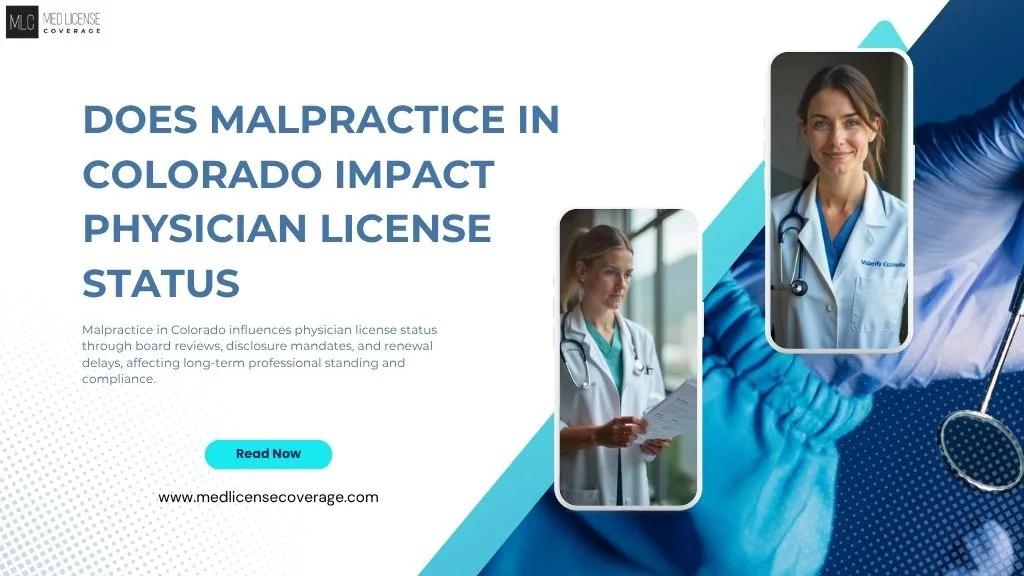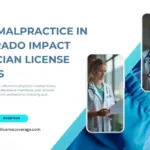Malpractice in Colorado carries serious consequences for physicians. State boards examine each allegation. License status may shift. Renewal becomes more difficult. Disciplinary actions may apply. Risk evaluation is strict.
Colorado’s Medical Licensing Authority
The Colorado Medical Board oversees licensing and discipline. Its mandate includes assessing malpractice in Colorado. Statutes provide guidance on how misconduct impacts license status. Regulations define when suspension, revocation, or conditional licensing may occur.
Disclosure Expectations for Licensure
Full disclosure of all malpractice in Colorado is required. Renewal forms demand details of claims, settlements, and judgments. Omitted or misleading disclosures trigger investigations. Transparency aids credibility with the board. Renewal can be refused without proper disclosure.
Investigations Triggered by Malpractice
Each malpractice complaint begins scrutiny. The board examines medical records, expert testimony, and case context. Investigations pause normal processing of applications. Active investigations may prevent license changes until resolution is complete.
Impact of Settlement or Judgment
Settlements and court judgments remain relevant. Even without admission of fault, boards assess the clinical derivation of each case. High settlement amounts may raise alarm. Patterns of claims carry more weight than one-time events.
Temporary Restrictions and Suspension
If malpractice in Colorado is serious, temporary suspension may follow. Restrictions may include supervision, reduced practice scope, or probation. These actions protect public welfare while evaluation continues. Conditional license status can replace full revocation in some cases.
Role of Corrective Education
Board-mandated courses often accompany disciplinary action. Continuing education in risk management, ethics, or documentation is common. Completion of these courses may become a requirement for license renewal or reinstatement.
Physician License Renewal Challenges
Malpractice in Colorado complicates physician license renewal. Renewal applications with unresolved claims face delays. The board demands updated litigation status and evidentiary documents. Renewals may be held in limbo until all cases are resolved.
Public Record and Transparency
Malpractice in Colorado, once adjudicated, enters public record. State disciplinary information becomes accessible to patients, employers, and insurers. Public visibility amplifies reputational risk. A clean public history improves future license standing.
Inter‑State Licensing Effects
Malpractice in Colorado affects licenses in other states via Malpractice by State mechanisms. Licensing apps elsewhere require disclosure of out‑of‑state claims. Other boards consult national data banks. A negative record in Colorado may prove a barrier elsewhere.
Specialty Risk and Board Scrutiny
Certain specialties attract higher scrutiny. Fields like surgery, obstetrics, and emergency medicine demonstrate elevated claim frequency. Boards evaluate malpractice in Colorado more rigorously in those specialties. High-risk profiles demand more robust defenses during licensing reviews.
Hospital Credentialing and Licensing
Hospitals review malpractice history before renewing privileges. Denied credentials often trigger board inquiries. License status and hospital privilege status are interlinked. Loss of hospital credentials may prompt further examination of physician license status.

Legal Counsel During Review
Legal counsel plays an essential role when malpractice in Colorado is under review. Attorneys help craft responses, submit protective records, or appeal decisions. Proper defense improves outcomes. Boards often consider legal strategy in final decisions.
Role of Physician Licensing Services
Physician licensing services assist during complex renewal or disciplinary processes. Such services collect documentation, track deadlines, and ensure statutory compliance. In malpractice‑impacted cases, they provide organization and reduce risk of administrative error.
Ethics and Standard of Care
Many malpractice cases revolve around ethical issues: consent, confidentiality, or record accuracy. Deviation from standard of care or professional responsibility intensifies board response. The board factors ethics heavily when evaluating malpractice in Colorado.
Evaluation of Clinical Practice Patterns
The board assesses patterns over time. A single event may not determine fate, but recurrent issues show systemic risk. The board reviews patient outcomes, documentation trends, and complaint volume to inform decisions about license status.
Reinstatement After Adverse Action
If a license is revoked or suspended, reinstatement is sometimes possible. Application for reinstatement demands proof of corrective action, compliance with board conditions, successful continuing education, and clean practice record. Services specializing in reinstatement manage this process.
Use of Technology in Licensing Review
The Colorado Medical Board uses digital systems to flag malpractice records. Automatic checks compare applications against national malpractice databases. Inconsistent data triggers manual review. Accuracy in submitted online files is critical.
Preventing Licensing Impact
Preventive practices reduce the effect of malpractice on licensing. Consistent documentation, informed consent, peer reviews, and proactive education help. Early intervention with physician licensing services before issues escalate supports license stability.
Timing and Renewal Windows
Malpractice in Colorado that is unresolved near renewal deadlines causes delays. The board reserves the right to withhold renewal until cases close. Physicians must file early, with full documentation, to avoid administrative hold.
Board Discretion and Case‑By‑Case Judgments
No blanket rule applies to every malpractice case. The Colorado board applies discretion. Case context, severity, corrective measures, and physician history all matter. Two similar claims may lead to different outcomes depending on facts.
Long-Term Licensing Record Effects
Malpractice in Colorado enters permanent licensing history. Future renewals revisit past cases. Patterns matter more than isolated incidents. Clean behavior over time mitigates earlier errors.
Career and Insurance Ramifications
License instability affects contracts, hospital affiliations, and professional reputation. Malpractice in Colorado heightens insurance premiums and affects malpractice coverage options. A stable license status improves professional viability.
Summary
Malpractice in Colorado affects physician license status at every stage: from initial application to renewal and reinstatement. Outcomes hinge on full disclosure, remediation, ethical compliance, and strong documentation. Physician license renewal becomes more demanding in such cases.
Successful navigation requires coordination between legal counsel, physician licensing services, and strong internal compliance. Long-term license stability rests on proactive conduct and transparent recordkeeping.







